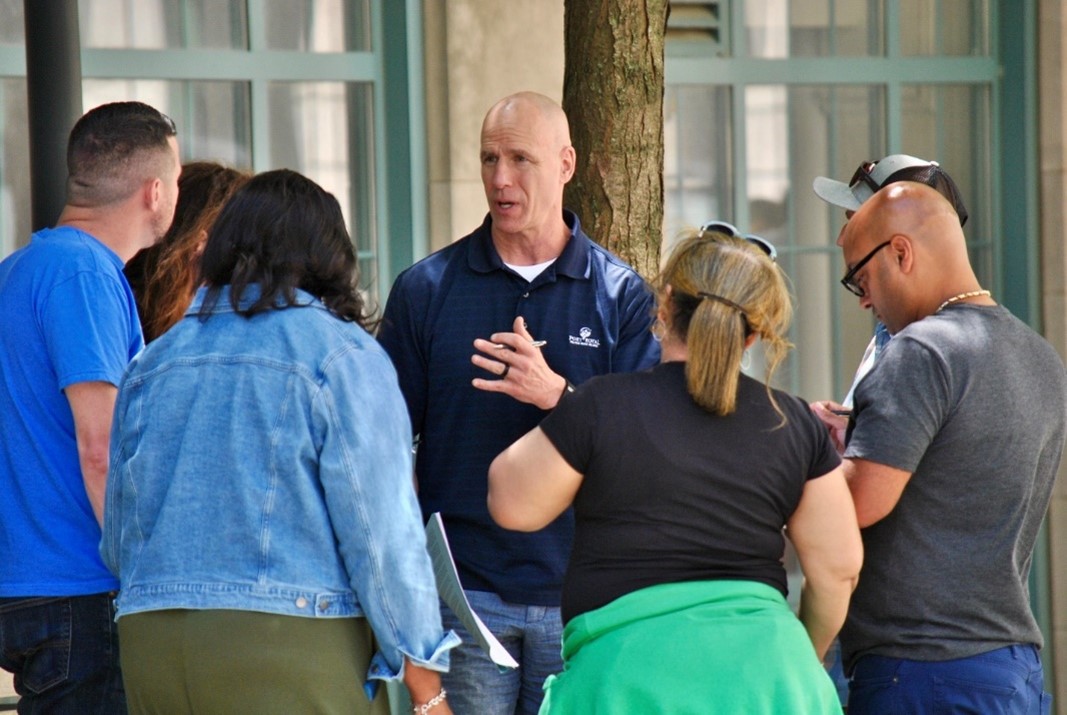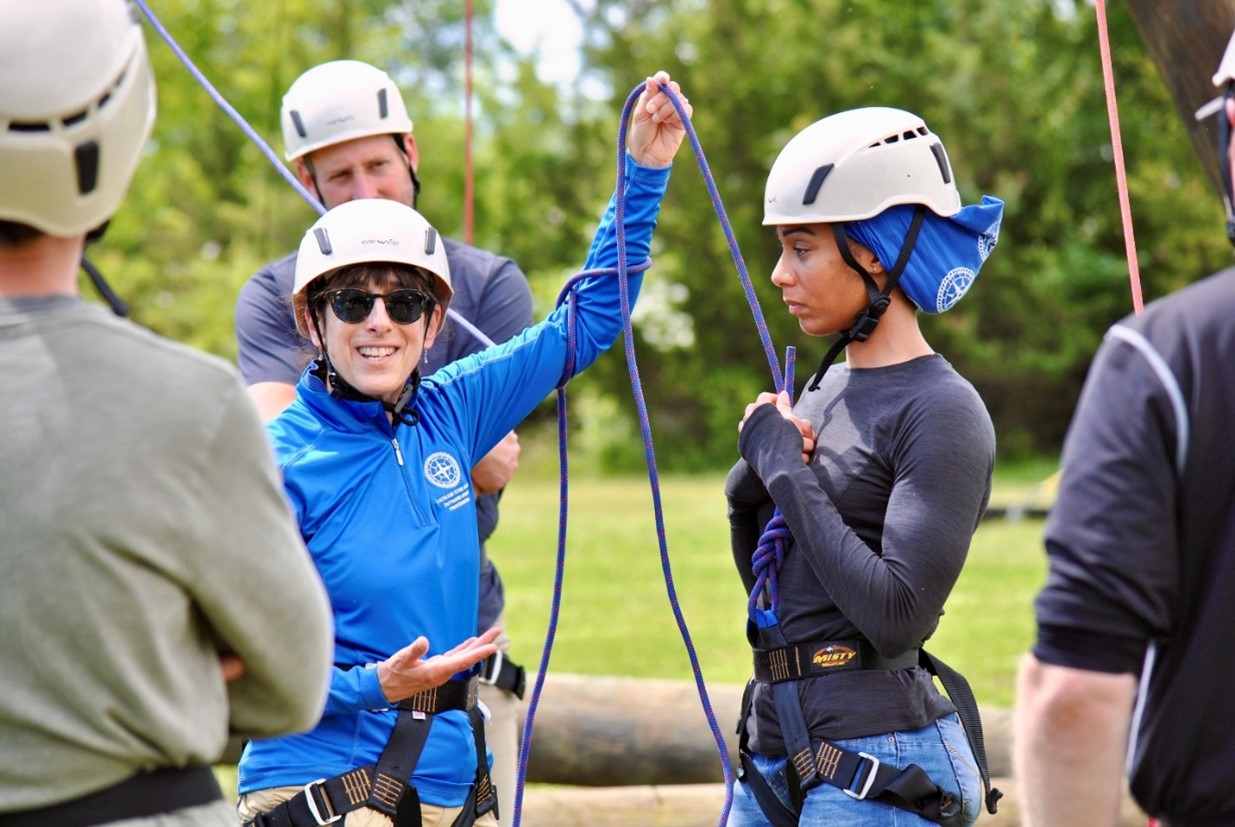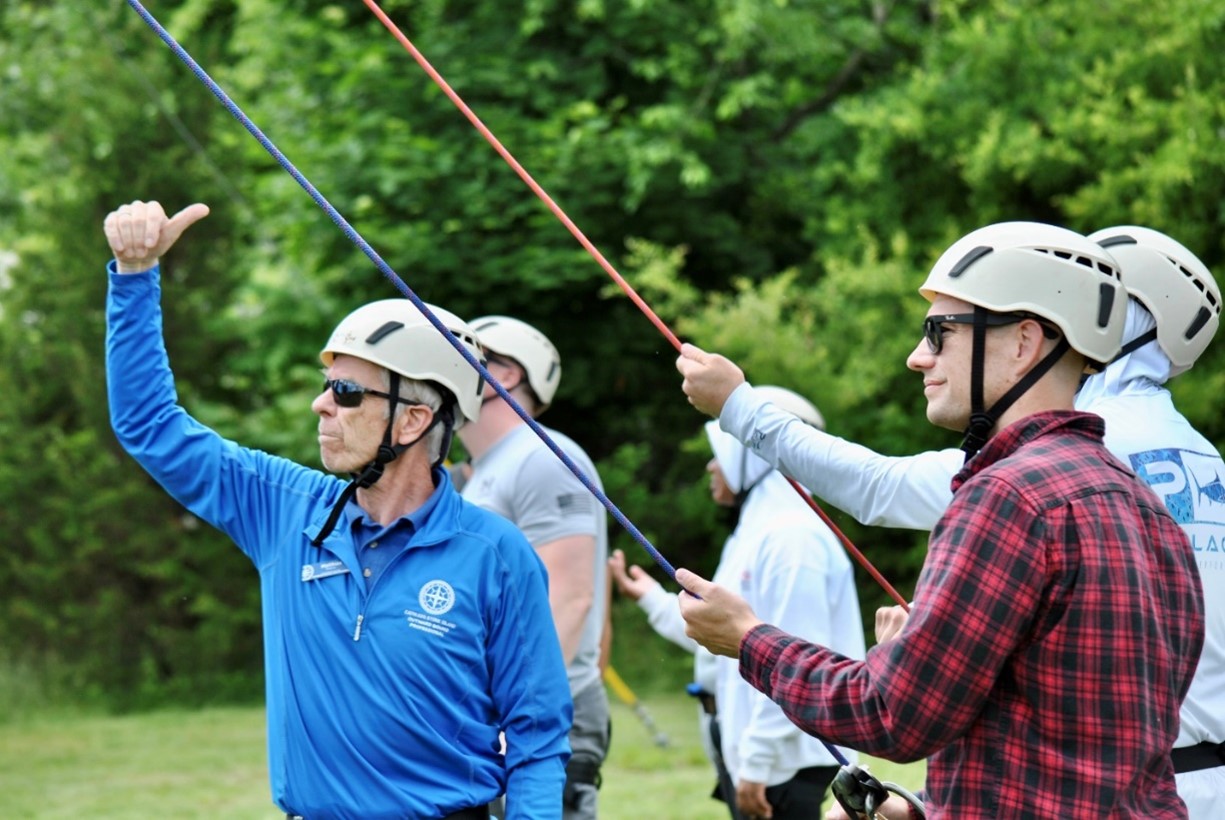|
August 3, 2024 SMIP incorporates Outward Bound to develop future police leaders
PERF Members, Last Friday we concluded our 2024 Senior Management Institute for Police (SMIP) sessions, so this week I’d like to provide a recap of this year’s program. Sessions 90 and 91 ran from June 2 through June 21, and Sessions 92 and 93 ran from July 7 through July 26. Including this year’s attendees, over 7,000 law enforcement leaders have graduated from SMIP. This year’s sessions included over 400 executives with diverse backgrounds from a wide range of agencies. Participants hailed from across the country and Canada, and from police departments large and small, federal agencies, sheriffs’ offices, college campuses, transit departments, and state agencies. We were proud to have had our first attendees from Hawai’i and a municipal agency in Alabama (we had two attendees from Alabama campus agencies in 2023). We also had an attendee from North Dakota for the first time since 1989.
Chris Myers from the Johns Hopkins Carey School of Business teaches Session 91 Over the course of the three-week program, the attendees heard from faculty from Harvard University’s Business School and Kennedy School of Government, the Massachusetts Institute of Technology (MIT), Johns Hopkins University, Dartmouth College, and the University of Texas at Austin. SMIP also featured subject matter experts on policing topics, as well as current and retired police leaders. Every day the participants joined in classroom discussions, case studies, negotiation exercises, and study groups. And attendees learned from one another informally as they exchanged ideas with colleagues from across North America.
Session 90 participants prepare for their negotiation exercise
Jody Greene (Massachusetts State Police) discusses a negotiation exercise with his group We update SMIP every year to maintain a relevant and challenging curriculum, and this year we made a major change to incorporate something bold and unique for the 2024 sessions.For the first time in SMIP’s history, we partnered with Outward Bound Professional (OBP). This was a significant addition to this year’s program. Outward Bound has provided outdoor education and leadership programs at sites around the country for over 70 years. It first came to my attention when I worked on a project in the NYPD’s 75th Precinct in the 1990s. At the time, that East New York neighborhood was sometimes referred to as the “killing fields.” Our objective was to work with a local community development organization to build ties between the community and police, and traditional meetings were not working. I heard Outward Bound was a way to take people out of their comfort zones and force them to work together to complete outdoor activities. So we brought cops and community members to an Outward Bound facility in upstate New York. One exercise required participants to build a raft, then paddle it to the middle of a lake. This was not the type of interaction these cops and community members were typically having in East New York. Everyone had fun, and the two groups began seeing each other in a different light. The experience built ties and helped the groups see that they needed each other to make their community safer. Boston’s OBP program is located on Cathleen Stone Island, one of Boston’s harbor islands. It offered an opportunity for attendees to learn outside of the classroom and put their leadership skills into action. OBP also provided a change of pace from the instructor-led learning we typically feature at SMIP.
View of the Boston skyline from Cathleen Stone Island When we first began discussing the pros and cons of incorporating OBP into SMIP last fall, we were not sure how our students would take to it. Injury concerns aside, we did not know whether cops would buy in to the experience. Was this going to be too corny? Were they going to be forced to hug trees, hold hands, and sing kumbaya? Luckily, no. We spoke with several law enforcement professionals who previously participated in an OBP excursion. Everyone we spoke with raved about their experience, so with cautious optimism, we decided to move forward with the partnership.
Session 91 student looks out at Boston Harbor Each session’s OBP day was longer than the typical SMIP classroom day. The excursion required students to board buses at 6:45 AM. The students were bused to Boston Harbor where they boarded a ship to Cathleen Stone Island. Once on the island, students were separated into pre-assigned groups where, led by OBP facilitators, they participated in activities throughout the day. The day concluded with a scenic lobster dinner on the island, overlooking the harbor and the Boston skyline. Afterwards, attendees were ferried back to Boston Harbor and bused back to Boston University’s campus, returning around 8:00 PM.
Session 91 participants celebrate after an exercise at OBP
OBP Senior Director Ellen Harris leads Session 91 participants through an exercise Activities included several problem-solving exercises that groups worked to complete. These activities mimicked real organizational challenges such as resolving communication issues, establishing trust, setting realistic goals, and working with people you don’t know (or maybe even like). While not every group participated in the same problem-solving activities, all groups participated in climbing a 62-foot-tall alpine tower. Donning helmets and harnesses, attendees learned about general climbing safety and belaying techniques. Within their groups, attendees took turns climbing, belaying, backup belaying, and coaching their teammates.
OBP Senior Director Ellen Harris reviews alpine tower safety protocols with Kelly Craig (Buffalo Police Department) and other Session 91 participants OBP facilitators say OBP exercises are “challenge by choice,” meaning attendees are encouraged to push themselves outside of their comfort zones. While no one was required to climb the alpine tower, participants were encouraged to do so to test their limitations and decision-making skills. Not all climbers made it to the top of the alpine tower; however, many who climbed made it higher than they thought possible and learned something about themselves in the process.
Ryan Harris (Denver Police Department) climbs the alpine tower
Members of Session 91 climb the alpine tower
OBP Facilitator Matthias Mokros observes climbers
Members of Session 91 start up the alpine tower After every exercise, OBP facilitators conducted a debrief with participants. Like agencies that have responded to a critical incident, OBP facilitators used debriefs to discuss what went well, what could have gone better, and what was learned during the activity. OBP facilitators ran the debriefs to discuss the leadership moments in each activity and incorporated perspectives and strategies the attendees learned in their SMIP classes. Facilitators were skilled at blending OBP’s existing framework with content the attendees were learning in the classroom. OBP facilitators adjusted the exercises and debriefs to seamlessly connect them to SMIP’s material. Ideas from the classroom that were referenced during debriefs included:
This allowed the participants to practice the ideas and strategies learned in the classroom in a scenario-based environment. Reflection is another connection between OBP and SMIP. At SMIP orientation, I tell every class that their time in Boston is a rare opportunity in their lives. They will have three weeks to focus on themselves as leaders and think about their careers. Personal reflection is a prominent theme throughout the OBP days. The debriefs at OBP force participants to reflect on their OBP activities and leadership experiences in their agencies. Without giving away any spoilers, the final exercise of the day asks participants to consider their OBP experience, reflect on who they are as leaders, and gives them an opportunity to hold themselves accountable in the future.
OBP Facilitator Peter Creighton leads a group of Session 91 participants in a debrief discussion SMIP uses daily evaluations to measure the impact and relevance of each class. Students gave the OBP days outstanding evaluations. OBP wasn’t for everyone (even our highest-rated classes have a few critics); however, the OBP days received overwhelmingly positive evaluations in all four sessions. The following are some thoughts and observations people communicated in person and in evaluations:
So, from our perspective, the OBP days were extremely worthwhile. We plan to include OBP in future SMIP programs. For the second straight year, we were proud to provide scholarships to several SMIP students who would not otherwise have been able to attend. Funding from MacKenzie Scott made these scholarships possible for eight deserving attendees. This year’s scholarship awardees were:
We are already getting questions about the 2025 SMIP program. We will post information on the 2025 sessions, such as session dates and tuition, in early September on the SMIP webpage. We anticipate having four sessions, two in June and two in July. Registration for SMIP 2025 will open on Tuesday, October 1. Please mark your calendars and register quickly, because the 2024 session was filled within eight days of opening.
I want to thank the PERF staff who worked on another successful SMIP program, especially Matt Harman, Dan Alioto, and Terry Chowanec, who spent the entire summer up in Boston. Every SMIP program takes a year to plan and requires contributions from staffers from all sections of the organization. I appreciate the work and dedication of our staff to make every SMIP program a successful one. Best, Chuck |














